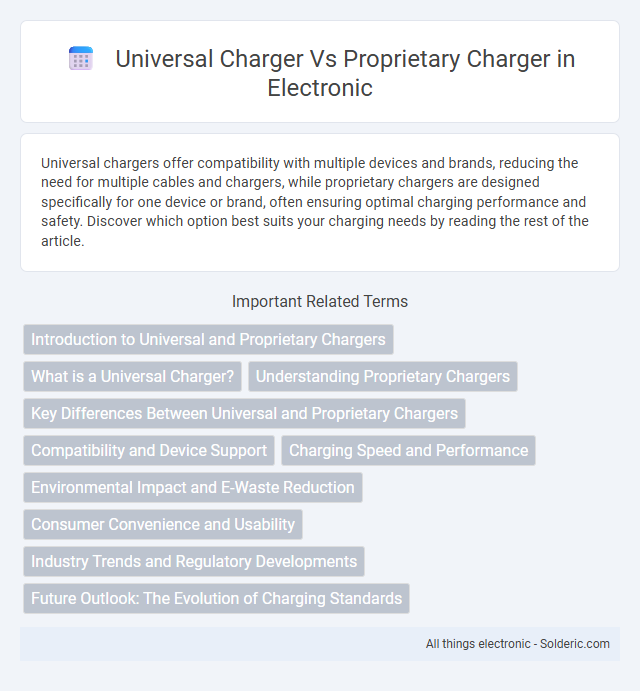Universal chargers offer compatibility with multiple devices and brands, reducing the need for multiple cables and chargers, while proprietary chargers are designed specifically for one device or brand, often ensuring optimal charging performance and safety. Discover which option best suits your charging needs by reading the rest of the article.
Comparison Table
| Feature | Universal Charger | Proprietary Charger |
|---|---|---|
| Compatibility | Works with multiple device brands and models | Limited to specific brand or device model |
| Convenience | One charger for several devices | Requires different chargers for different devices |
| Cost | Usually affordable and widely available | Often more expensive due to brand exclusivity |
| Charging Speed | Varies; may support fast charging standards like USB Power Delivery | Optimized for device; can offer faster or more efficient charging |
| Build and Quality | Standardized quality; varies by manufacturer | High-quality materials usually ensured by the brand |
| Portability | Compact and lightweight for multi-device use | Designed specifically for device size and shape |
| Replacement and Availability | Easy to replace; sold globally | Replacement parts may be limited and costly |
| Safety Features | Includes standard protections (overcharge, short circuit) | Enhanced safety tuned to device specifications |
Introduction to Universal and Proprietary Chargers
Universal chargers support multiple device brands and models using standardized connectors such as USB-C, enabling broad compatibility and reducing electronic waste. Proprietary chargers are designed specifically for individual devices or brands, often featuring unique connectors and tailored charging protocols that optimize performance but limit interchangeability. Choosing between universal and proprietary chargers impacts convenience, device lifespan, and overall user experience.
What is a Universal Charger?
A universal charger is a versatile power adapter designed to charge multiple device types across brands by providing standardized connectors and adjustable voltage settings. It eliminates the need for multiple proprietary chargers, supporting compatibility with smartphones, tablets, laptops, and other electronic gadgets through interchangeable tips or USB ports. Universal chargers enhance convenience and reduce electronic waste by offering a single solution for diverse charging requirements.
Understanding Proprietary Chargers
Proprietary chargers are designed specifically for a particular brand or model, optimizing charging speed and compatibility with your device's hardware. These chargers often include unique connectors and communication protocols that ensure safe and efficient power delivery tailored to the device. Understanding proprietary chargers helps you recognize why using the right charger is essential to maintain battery health and device performance.
Key Differences Between Universal and Proprietary Chargers
Universal chargers support multiple device brands and models by providing standard connectors and adjustable voltage settings, ensuring wide compatibility and convenience for users. Proprietary chargers are designed specifically for a particular device or brand, often optimizing charging speed and safety tailored to that product's specifications. Understanding these key differences helps you choose the charger that best fits your device needs and charging habits.
Compatibility and Device Support
Universal chargers offer broad compatibility with multiple devices across various brands by using standard connectors such as USB-C or Micro-USB, supporting fast charging protocols like USB Power Delivery. Proprietary chargers are specifically designed for particular devices or manufacturer ecosystems, ensuring optimal performance but limiting compatibility to the intended product range. Device support for universal chargers extends to smartphones, tablets, laptops, and accessories, while proprietary chargers often provide deeper integration features like device-specific power management and safety functions.
Charging Speed and Performance
Universal chargers often support multiple charging standards like USB Power Delivery (PD) and Quick Charge, enabling faster charging speeds across various devices compared to proprietary chargers limited to specific protocols. Proprietary chargers can deliver optimized performance through tailored voltage and current regulation, maximizing efficiency for compatible devices but lacking versatility. Universal chargers provide broader compatibility and competitive charging speeds, while proprietary options may offer superior performance within their device ecosystem.
Environmental Impact and E-Waste Reduction
Universal chargers significantly reduce environmental impact by minimizing electronic waste through their compatibility with multiple devices, decreasing the need for producing separate chargers. Proprietary chargers often contribute to increased e-waste since they become obsolete with device upgrades, leading to more discarded electronics. Choosing a universal charger helps you lower your carbon footprint and supports sustainable consumption by extending the charger's usability across various gadgets.
Consumer Convenience and Usability
Universal chargers significantly enhance consumer convenience by supporting multiple device types and brands through standardized connectors like USB-C, reducing the need to carry multiple chargers. Proprietary chargers often limit usability, as consumers must use specific cables and adapters designed exclusively for their devices, leading to inconvenience during travel or device changes. The widespread adoption of universal chargers also promotes easier replacement and compatibility, streamlining daily charging routines for users.
Industry Trends and Regulatory Developments
The trend towards universal chargers, such as USB-C, is driven by regulatory initiatives like the European Union's mandate to standardize charging ports to reduce electronic waste and consumer inconvenience. Major manufacturers are increasingly adopting universal standards to comply with regulations and to enhance interoperability across devices. This shift not only encourages sustainable practices but also promotes a competitive market by limiting proprietary technologies that lock consumers into specific ecosystems.
Future Outlook: The Evolution of Charging Standards
The future of charging standards is moving toward universal chargers like USB-C, driven by regulatory mandates and industry agreements to reduce electronic waste and improve device compatibility. Proprietary chargers, often limited to specific brands or models, face declining adoption as consumers and manufacturers favor the convenience of standardized, fast-charging protocols. Advancements in universal charging technology promise enhanced power delivery, cross-device interoperability, and a more sustainable electronics ecosystem.
universal charger vs proprietary charger Infographic

 solderic.com
solderic.com